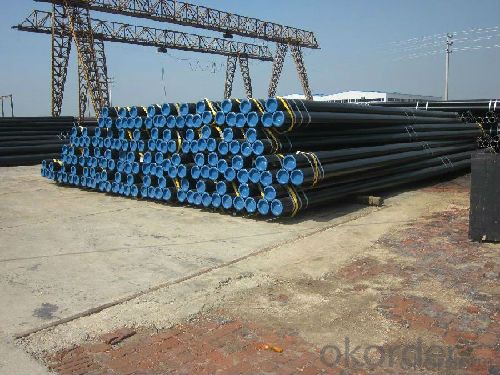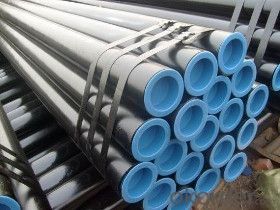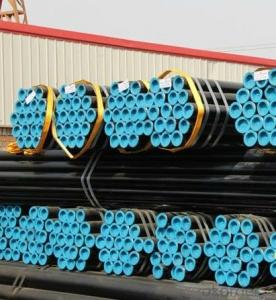ASTM A106B Seamless Steel Pipe
- Loading Port:
- China Main Port
- Payment Terms:
- TT or LC
- Min Order Qty:
- -
- Supply Capability:
- -
OKorder Service Pledge
OKorder Financial Service
You Might Also Like
Quick Details
| Thickness: | 4 - 100 mm | Section Shape: | Round | Outer Diameter: | 27 - 508 mm |
| Place of Origin: | Shandong China (Mainland) | Secondary Or Not: | Non-secondary | Application: | Structure Pipe |
| Technique: | Hot Rolled | Certification: | API | Surface Treatment: | Black painted or oiled |
| Special Pipe: | Thick Wall Pipe | Alloy Or Not: | Non-alloy | ||
| OD: | 1/2"-22" | Length: | 5-12m | Certificates: | ISO&API |
| Grade: | 20#,16Mn,A53(A,B),A106(B,C),St37,St52,St42,St35.8,10#-45#,A53-A369,ST35-ST52 | Standard: | GB/T 8162-1999,DIN 1629/3,ASTM A106-2006,GB,DIN,ASTM |
Packaging & Delivery
| Packaging Detail: | wrapped in bundles with steel strips |
| Delivery Detail: | 30days |
Specifications
1, We manufacture steel pipes
2, Main market: Asia, South America
3, Advantage: Medium and Thick wall pipe
4, High quaility
ASTM A106B Seamless Steel Pipe Image


FAQ of ASTM A106B Seamless Steel Pipe
①How is the quality of your products?
Our products are manufactured strictly according to national and internaional standard, and we take a test
on every pipe before delivered out. If you want see our quality certifications and all kinds of testing report, please just ask us for it.
Guaranteed: If products’ quality don’t accord to discription as we give or the promise before you place order, we promise 100% refund.
②How about price?
Yes, we are factory and be able to give you lowest price below market one, and we have a policy that “ for saving time and absolutely honest business attitude, we quote as lowest as possible for any customer, and discount can be given according to quantity”,if you like bargain and factory price is not low enough as you think, just don’t waste your time.Please trust the quotation we would give you, it is professional one.
③Why should you chose us?
Chose happens because of quality, then price, We can give you both.Additionally, we can also offer professional products inquiry, products knowledge train(for agents), smooth goods delivery, exellent customer solution proposals.Our service formula: good quality+good price+good service=customer’s trust
SGS test is available, customer inspection before shipping is welcome, third party inspection is no problem.
Any question, pls feel free to contact us !
- Q:How do steel pipes handle abrasive materials?
- Steel pipes are highly durable and resistant to abrasion, making them well-suited to handle abrasive materials. The smooth interior surface of steel pipes minimizes friction and wear caused by the movement of such materials, ensuring their efficient and effective transportation.
- Q:What is the meaning of "DN" and "Phi" in the dimensioning of steel pipe diameter and how to apply the mark?
- DN refers to the nominal diameter of the pipe, but this is neither the outside diameter nor the inside diameter, and the "Phi" means the outer diameter of the steel pipe. For example, the same nominal diameter of the steel pipe due to its different wall thickness, corresponding to the outer diameter is also different. As can be seen from the chart below:Project control table (commonly used) diameter pressure pipe standard pressure pipe standard pressure pipe standard specification DN- nominal diameter: diameter of large diameter series DN15- 22mm DN20- 27mm DN25- phi, Phi Phi Phi Phi 34mm, DN32- 42mm DN40- 48mm DN50- 60mm DN65-, Phi Phi 76 (73) mm, DN80- 89mm DN100- 114mm DN125- and Phi Phi Phi. 140mm DN150- 168mm DN200- 219mm DN250- phi, Phi Phi Phi Phi 273mm, DN300- 324mm DN350- 360mm DN400- 406mm DN450- 457mm DN500- and Phi Phi Phi Phi, 508mm DN600- 610mm, DN15- 18mm series of small diameter Phi Phi Phi, DN20- 25mm DN25- 32mm DN32- 38mm DN40- 45mm DN50- Phi Phi, Phi Phi Phi 57mm DN65- 73mm, DN80- 89mm DN100- 108mm, DN125- 133mm DN150- 159mm DN200- and Phi Phi Phi Phi, 219mm DN250- 273mm DN300- 325mm DN350- 377mm, Phi phi,
- Q:How are steel pipes used in the manufacturing of furniture and appliances?
- Due to their strength, durability, and versatility, steel pipes find widespread use in the production of furniture and appliances. In furniture manufacturing, they are commonly employed to construct the frames and structures of various pieces, including chairs, tables, and beds. Serving as the primary support system, these pipes ensure a sturdy and dependable foundation for the furniture. In appliances, steel pipes serve multiple purposes. They are frequently utilized to create the internal framework and bear the weight of kitchen appliances such as stoves, ovens, and refrigerators. Additionally, steel pipes are commonly found in washing machines, dryers, and dishwashers, facilitating the transportation of water and other fluids throughout the appliance. Moreover, steel pipes are essential in the manufacture of outdoor furniture and equipment that require weather resistance and durability. To safeguard against rust and corrosion, these pipes are often coated with protective materials, thus ensuring the longevity of the furniture and appliances. In conclusion, steel pipes play a vital role in the production of furniture and appliances, providing the necessary strength and support. Their versatility allows for various applications, making them an indispensable component in the manufacturing process of these goods.
- Q:How are steel pipes used in the construction of power plants?
- Steel pipes are commonly used in the construction of power plants for various purposes such as transporting fluids, gases, and steam, as well as for structural support. They are used to create a network of pipelines that carry coolant water, fuel, and other necessary fluids to different areas of the plant. Additionally, steel pipes are used for steam generation, connecting boilers to turbines and condensers, ensuring efficient energy production. The durability, strength, and high-temperature resistance of steel pipes make them an ideal choice for the demanding conditions in power plants.
- Q:How are steel pipes used in oil refineries?
- Steel pipes are used in oil refineries for various purposes such as transporting crude oil, refined petroleum products, and other chemicals throughout the facility. They are crucial for the overall infrastructure, including piping networks, storage tanks, and processing units, ensuring efficient and safe fluid flow.
- Q:What is the primary purpose of steel pipes?
- The primary purpose of steel pipes is to transport fluids and gases, such as water, oil, and natural gas, over long distances efficiently and safely. They are commonly used in various industries including construction, oil and gas, and infrastructure development.
- Q:What are the different methods of wrapping steel pipes for corrosion protection?
- There are several different methods of wrapping steel pipes for corrosion protection. These methods can vary depending on the specific application and environmental conditions. Some of the common methods include: 1. Tape Wrapping: This involves wrapping the steel pipes with a corrosion-resistant tape, such as polyethylene or polypropylene tape. The tape acts as a barrier between the pipe surface and the corrosive elements, preventing direct contact and reducing the risk of corrosion. 2. Inner Wrapping: Inner wrapping involves applying a protective coating or lining to the inside surface of the steel pipe. This method is commonly used for pipes that transport fluids or gases, as it provides an additional layer of protection against corrosion from the inside. 3. External Coating: External coating is a widely used method for corrosion protection. It involves applying a protective coating to the outside surface of the steel pipe. The coating can be a variety of materials, such as epoxy, polyethylene, or polyurethane, which provide a barrier against corrosive elements and extend the lifespan of the pipe. 4. Cathodic Protection: Cathodic protection is an electrochemical method used to protect steel pipes from corrosion. It involves connecting the steel pipe to a sacrificial anode, such as zinc or magnesium, which corrodes instead of the pipe. This process helps to prevent the corrosion of the steel pipe by diverting the corrosive current away from the pipe surface. 5. Heat Shrink Sleeve: Heat shrink sleeves are commonly used for corrosion protection in underground or submerged applications. These sleeves are made of a heat-activated material that shrinks when heated, creating a tight seal around the pipe. The sleeve forms an effective barrier against moisture and corrosive elements, preventing direct contact with the steel pipe. 6. Fusion Bonded Epoxy (FBE) Coating: FBE coating is a thermosetting powder coating that is applied to the surface of the steel pipe and then fused to form a protective layer. This coating provides excellent adhesion and corrosion resistance, making it a popular choice for steel pipes in various applications. It is important to note that the selection of the appropriate method for wrapping steel pipes for corrosion protection depends on factors such as the environment, the type of corrosive elements present, the intended application, and other specific requirements. Professional advice and consultation may be necessary to determine the most suitable method for a particular situation.
- Q:Can steel pipes be recycled and used for other purposes?
- Yes, steel pipes can be recycled and used for other purposes. Due to their durability and strength, steel pipes can be melted down and repurposed for various applications, including construction, manufacturing, and infrastructure projects. Recycling steel pipes not only saves resources but also contributes to reducing waste and promoting sustainability.
- Q:How are steel pipes used in the construction of skyscrapers?
- Steel pipes are commonly used in the construction of skyscrapers for their strength, durability, and versatility. These pipes are typically used as structural elements, forming the framework of the building, providing support and stability. They are used in the construction of columns, beams, and braces, enabling the building to withstand heavy loads and high winds. Additionally, steel pipes are used for plumbing and mechanical systems, carrying water, gas, and other utilities throughout the building. Their use in skyscrapers ensures the overall strength and integrity of the structure.
- Q:How are steel pipes protected against internal corrosion?
- Steel pipes are protected against internal corrosion through the use of various methods such as coating the inner surface with corrosion-resistant materials, applying chemical inhibitors to the fluid being transported, and implementing cathodic protection systems.
1. Manufacturer Overview |
|
|---|---|
| Location | |
| Year Established | |
| Annual Output Value | |
| Main Markets | |
| Company Certifications | |
2. Manufacturer Certificates |
|
|---|---|
| a) Certification Name | |
| Range | |
| Reference | |
| Validity Period | |
3. Manufacturer Capability |
|
|---|---|
| a)Trade Capacity | |
| Nearest Port | |
| Export Percentage | |
| No.of Employees in Trade Department | |
| Language Spoken: | |
| b)Factory Information | |
| Factory Size: | |
| No. of Production Lines | |
| Contract Manufacturing | |
| Product Price Range | |
Send your message to us
ASTM A106B Seamless Steel Pipe
- Loading Port:
- China Main Port
- Payment Terms:
- TT or LC
- Min Order Qty:
- -
- Supply Capability:
- -
OKorder Service Pledge
OKorder Financial Service
Similar products
New products
Hot products
Related keywords































